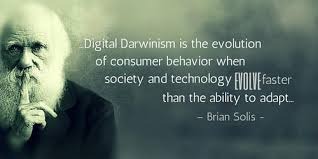Digital Darwinism and the Age of Assistance
It is an evolution that I have been following and I have written about how AI and machine learning are pushing us closer to that new age. I jokingly said that I was accepting resumes for a digital assistant. And most recently, the amazing and also frightening Google Duplex demo made me wonder if we don't need a reverse Turing test for AI.
It has been suggested that in this era where technology and society are evolving faster than businesses and schools can naturally adapt, the mantra of “adapt or die” comes into play. You can react to change, be disrupted by it, or adapt. Brian Solis and others have referred to this as "Digital Darwinism."
As with the more established Darwinism, the digital version is pretty indiscriminate when it comes to which products or companies survive, thrive or fade.
 I suppose we are still officially in the Information Age, but I think we may be evolving into an Age of Assistance. There is some evidence of this when you hear people say things like "Google, dim the bedroom lights" or "Alexa, play music by James Taylor."
I suppose we are still officially in the Information Age, but I think we may be evolving into an Age of Assistance. There is some evidence of this when you hear people say things like "Google, dim the bedroom lights" or "Alexa, play music by James Taylor."
As in nature, we need experimentation and adpatations and even new species to survive. And some will have to go extinct. Goodbye Blockbuster, Circuit City, Borders Books, Tower Records, Pontiac, Saturn, and Palm. Hello Netflix, which then had to evolve (and is still doing so) to be a streaming rather than discs-in-the-mail service.
This pruning is clearly happening in business. Have any colleges fallen aside via Digital Darwinism? (A colleague answered that question by only half-sarcastically saying "Trump University.")
Artificial intelligence and machine learning are big drivers in Digital Darwinism. Is it true that Digital Darwinism has pushed open the door to an age of assitance a bit wider?
That push comes from artifical intelligence combined with speech recognition.
Though smartphones and standalone devices with Siri, Alexa et al have put this assistance in front of consumers, digital speech recognition didn't start with those devices. The IBM Shoebox was shown to the general public during the 1962 Seattle World's Fair. It was launched in 1961 - almost 20 years before the introduction of the first IBM Personal Computer. It was able to recognize 16 spoken words and the digits 0 to 9.
Most speech recognition systems require some "training" from users and with AI they learn to respond more accurately and efficiently. We have moved away from the earlier "speaker dependent" systems in some ways. They have to learn a particular user's speech patterns, accent, pronunciation etc. Newer systems tend to be independent and aggregate patterns from the many users that are connected to them more than focus on one user. It's not your Alexa. It's everyone's Alexa.
The rise of smart speakers in the past year via their sales (sales that have more than tripled) like Google Home and Amazon Echo have made some humans more reliant on voice commands.
Google has been talking and offering voice search for a few years and we ceratinly sometimes use voice to seach on our phones. But, if you're like me, you still find that technology lacking in most instances. But the voice search revolution is still predicted to happen and I don't doubt that it will occur, though perhaps more evolutionarily than revolutionariy.
The sophistication of voice-recognition systems is improving rapidly. Microsoft’s Cortana voice recognition software (which doesn't get as much attention it seems) now has an error rate of 5.1 percent, which gets it up there with human counterparts. With Microsoft large installed base of Windows-based personal computers, smartphones and smart speakers, they will certain be players in this area.
Google Assistant is a virtual assistant primarily available on mobile and smart home devices, and (unlike Google Now) it can engage in two-way conversations.
What I find on this topic online is primarily about marketing, but I believe it also applies to education.
Consumers are researching just about everything they buy and want relevant results. they want assistance. In an Age of Assistance, we are finding that assistance in what is being refferred to as mobile-first “micro-moments.”
This is way beyond classical marketing. Currently, I don't see many examples in eduction of schools getting into new opportunities for “assisted” engagement. Is your help desk using voivce recognition and AI? Is it in other student support services? can a student in a course that is online or in a classroom use voice to aska question of a digital assistent at 1 AM when they are stuck on a problem?
Those few schools that are adapting and experimenting with these technologies might be safer down the evolutionary road when Digital Darwinism starts to make programs or colleges digital Dodo birds.
Digital Darwinism: Survival of the Fittest in the Age of Business Disruption
Digital Darwinism: Branding and Business Models in Jeopardy
FURTHER READING
thinkwithgoogle.com/intl/en-154/insights-inspiration/thought-leadership/marketing-age-assistance/
thinkwithgoogle.com/intl/en-gb/consumer-insights/search-in-the-age-of-assistance/
forbes.com/sites/briansolis/2017/10/11/wtf-whats-the-future-of-marketing-in-the-age-of-assistance/




 You're probably tired of stories about privacy, Facebook and social media. But in the midst of all that the past few months, I continue to see lots of my online friends taking quizzes, liking posts and especially uploading photos.
You're probably tired of stories about privacy, Facebook and social media. But in the midst of all that the past few months, I continue to see lots of my online friends taking quizzes, liking posts and especially uploading photos.